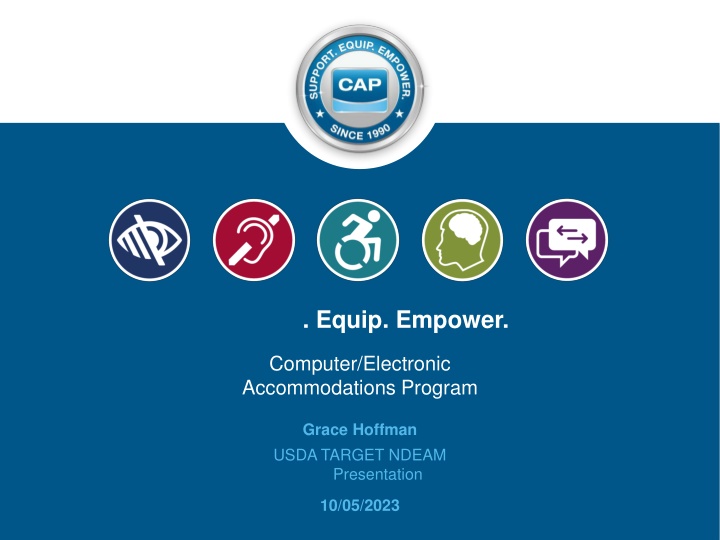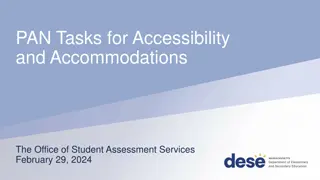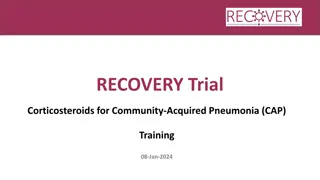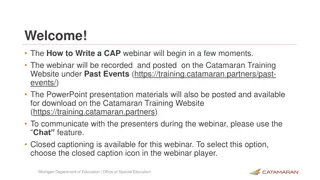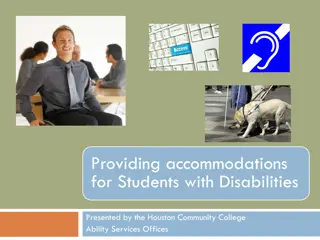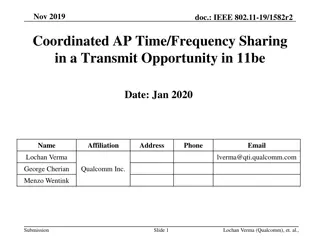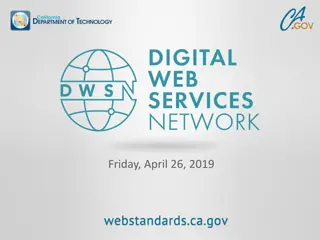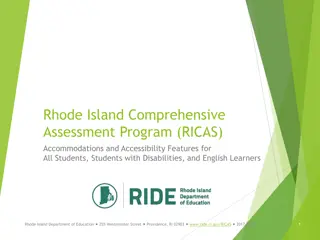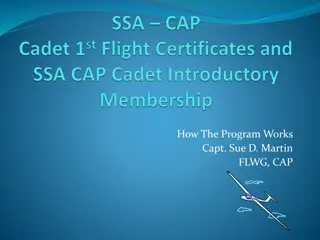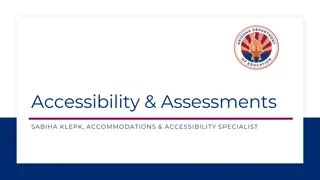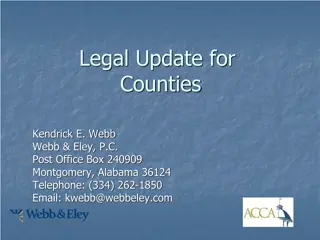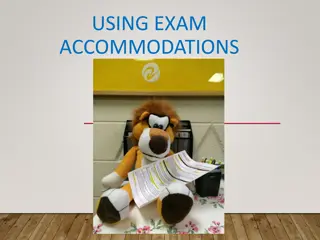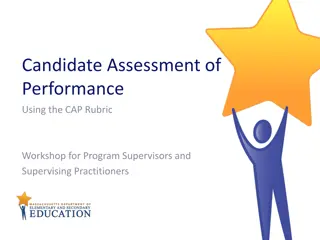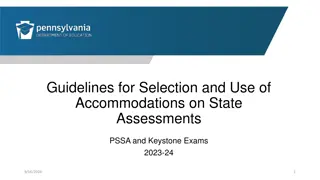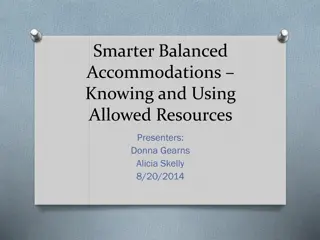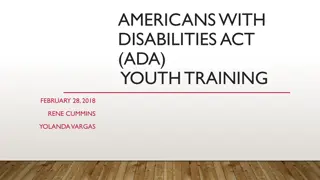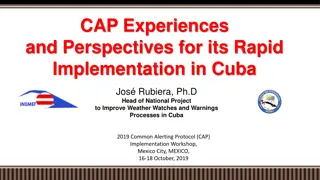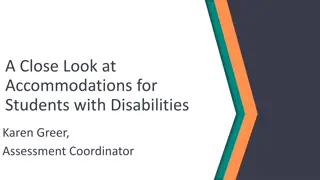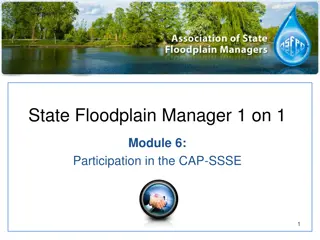Computer/Electronic Accommodations Program (CAP) Overview and Impact on Accessibility
Providing insights into the Computer/Electronic Accommodations Program (CAP) established by the Department of Defense to support employees with disabilities and Service members, this presentation covers the program's background, services, and outreach activities. Learn how CAP equips individuals with assistive technology and promotes equity and inclusion within the DoD, advancing accessibility and empowerment for disabled personnel. The discussion also touches on legal frameworks like the Rehabilitation Act of 1973, emphasizing the importance of reasonable accommodations and non-discrimination practices.
Download Presentation

Please find below an Image/Link to download the presentation.
The content on the website is provided AS IS for your information and personal use only. It may not be sold, licensed, or shared on other websites without obtaining consent from the author.If you encounter any issues during the download, it is possible that the publisher has removed the file from their server.
You are allowed to download the files provided on this website for personal or commercial use, subject to the condition that they are used lawfully. All files are the property of their respective owners.
The content on the website is provided AS IS for your information and personal use only. It may not be sold, licensed, or shared on other websites without obtaining consent from the author.
E N D
Presentation Transcript
Support. Equip. Empower. Computer/Electronic Accommodations Program Grace Hoffman USDA TARGET NDEAM Presentation 10/05/2023
Purpose and Agenda Purpose To provide an understanding of the Computer/Electronic Accommodations Program (CAP). Agenda CAP Overview CAP Customers and Services CAP Resources Questions 3
What is CAP? Department of Defense (DoD) Centrally Funded Program Support DoD employees with disabilities and wounded, ill and injured Service members Equip employees and Service members with assistive technology (AT) and services, as reasonable accommodations Empower employees with equity, inclusion and accessibility promoting their support of the DoD mission 5
CAP Background 1990 Centrally funded program established to accommodate employees with disabilities of the DoD 2000 Expanded to cover select non-DoD Executive Branch Federal Agencies 2004 Expanded to cover wounded, ill, and injured (WII) Service members (SM) who remain on active duty to include National Guard and Reserve members under Title 10 and allow Service members to keep AT upon separation from military 2021 CAP conducts needs assessments and consultation to 70 non- DoD agencies of the executive branch. Agencies procure AT 2022 Conducts needs assessments and procures AT for DoD employees and WII SM. Continues providing needs assessments and consultation to non-DoD agencies. 6
Rehabilitation Act of 1973 Requires federal agencies to reasonably accommodate job applicants and employees with disabilities Section 504 Section 501 Section 508 Prohibits federal employment discrimination against individuals with disabilities Prohibits discrimination in any federally-funded program, service or agency Specifies federal information communication technology must be accessible and usable for both employees and the public Mandates affirmative action 7
Rehabilitation Act of 1973 Mandates Requires employees with disabilities have equal access to ALL benefits and privileges of employment, including: Training Services such as employee assistance programs, credit unions, cafeterias, lounges, gyms, auditoriums, and transportation Social functions and parties Applies to all federal agencies, as well as any activities or programs that receive federal funding. Mandates agencies that interact with the public must provide accommodations for members of the public. 8
Department of Defense Instruction (DoDI) DoDI 6025.22 (2015) Assistive Technology for Wounded, Ill, and Injured Service Members DoDI 1000.31 (2018) Computer/Electronic Accommodations Program Establishes cooperation and contact between CAP, Military Treatment Facilities (MTF), and Wounded Warrior Program. Lays out CAP s basic responsibilities, procedures, and policies. Specifies which agencies, individuals, and DoD components can receive services from CAP. CAP must provide active-duty service members with assistive technology. 2022/2023: Reissue DoDI 1000.31 in progress New CAP DoDI will combine 1000.31 and 6025.22 9
CAP Teams 10
Customers: Service Members Active duty Service members, including: Wounded, ill, and injured active duty Service members. Service members continuing on active duty (COAD). National Guard and Reserve Service members serving on full-time active duty under Title 10, U.S.C. 12
Customers: Civilians DoD employees with disabling conditions including: DoD managers who are ready to hire and accommodate (Schedule A). Workers Compensation beneficiaries Term and Temporary Employees, Workforce Recruitment Program (WRP) Interns Detail appointments DoD agencies that want to ensure their programs and services are accessible. Federal partner agencies with employees that require needs assessments. 13
CAP Quiz Which of the following qualify as computer/electronic assistive technology? *Select all that apply a. Work place furniture to support employee for medical issues. b. Lighting and soundproofing modifications to improve the work space. A service or device to increase functional capabilities of disabled individuals. d. Scooters, wheelchairs and/or building modifications to improve work place access. c. 14
Assistive Technology Act (AT) Definitions As defined by the Assistive Technology Act of 1998 AT services assist an individual with a disability in the selection, acquisition, or use of an assistive technology device. AT devices are used to increase, maintain, or improve the functional capabilities of individuals with disabilities. 15
CAP Services Interpreting Services Training/Technical Services CART Services Technology Demonstration Video/Media Captioning Services Needs Assessments 16
CAP Disability Categories Dexterity Cognition Deaf/Hard of Hearing Communication Blind/Low Vision 17
Dexterity What are Dexterity Conditions? Dexterity conditions refer to any physical disability that limits the physical function of one or more limbs. conditions may include quadriplegia, paraplegia, multiple sclerosis, cerebral palsy, carpal tunnel syndrome, tendonitis, arthritis, sciatica, amputations or degenerative disc disease. limitations affecting mobility could include decreased range of motion in the arms, fingers, wrists, back or neck, and decreased muscle control, spasms, paralysis, tingling or numbness. 18
Dexterity Solutions Dexterity accommodations may include: Alternative keyboards, input devices, and voice recognition software Back / seat support Positioning tools such as document holders, monitor arms, and keyboard trays Telephone headsets 19
Blind/Low Vision What are Vision Conditions? Vision conditions: Impact the ability to see, either partially or completely. Conditions may include glaucoma, cataracts, macular degeneration, retinopathy or total blindness. Limitations could include blurriness, blind spots, floaters, tunnel vision or any other visual disturbances. 20
Blind/Low Vision Solutions Vision accommodations may include: Screen readers Magnification software Closed circuit televisions (CCTVs) Notetakers Scanner / readers Large print keyboards Braille displays / braille embossers 21
Deaf/ Hard of Hearing What are Hearing Conditions? Hearing conditions: Impact the ability to hear, either partially or completely. Conditions may include otosclerosis, tinnitus, and deafness. May cause limitations resulting in difficulty hearing certain volumes, tones or frequencies, ringing in the ears, or the inability to hear anything at all. 22
Hearing Solutions Hearing accommodations may include: Assistive listening devices such as Frequency Modulation (FM) systems Telephone access through videophones, captioned telephones, or amplified telephones Clear masks Deaf-to-Hearing communication devices 23
Cognition What are Cognitive Conditions? Cognitive conditions: Include any disorder that significantly impairs the cognitive function of an individual. May include dyslexia, attention deficit hyperactivity disorder (ADHD), multiple sclerosis, stroke, Alzheimer's disease, and traumatic brain injury (TBI). Limitations could include memory loss, decreased organization, decreased concentration, word finding difficulty, or orientation difficulty. 24
Cognition Solutions Cognitive accommodations may include: Cueing and memory aids Literacy software Noise cancelling headsets Recording devices such as pens and digital voice recorders 25
Communication What are Communication Conditions? Communication conditions: Impact an individual's ability to communicate May include apraxia or voice disorders Limitations may include the inability to amplify the volume of speech or being non-verbal 26
Communication Solutions Communication accommodations may include: Voice amplification devices Word prediction software Augmentative communication devices 27
Budget Budget CAP complies with organization cutoff dates and acquisition timelines in accordance with Federal Acquisitions Regulations (FAR). CAP Annual Budget Highlights 01 OCT - 30 SEP: Annual Fiscal Year (FY) budget NOV: Generally new FY funding becomes available JUN/JUL: Acquisition cut off dates occur to ensure proper budget closeout 28
Best Practice CAP accepts requests at all times. Timing of the request may impact approval and delivery. 29
CAP Resources www.cap.mil We have developed a series of online training modules. Learn about disability etiquette, reasonable accommodations, how to work with CAP and challenges in employment. CAP s Online Training Modules CAP has created a series of short videos to help answer some of our customer s most frequently asked questions. CAP s Quick Tips CAP has recorded a series of webinars to share the CAP training experience with our customers and stakeholders around the world. To see newly recorded webinars and a list of upcoming topics, please visit our website. CAP s Webinars CAP may be able to come to your location to provide briefings, trainings, and needs assessments. Please visit the Training & Outreach section of our website to request CAP's attendance. Request CAP at Your Event 31
Connect with CAP Facebook www.facebook.com/DoDCAP Twitter www.twitter.com/DoDCAP YouTube www.youtube.com/TheDoDCAP Instagram www.instagram.com/dod_cap 32
CAP Contact Information Phone: 703-614-8416 833-227-3272 Videophone: 571-384-5629 Email: cap@mail.mil Website: www.cap.mil CAPTEC Phone: 703-693-5160 Email: cap.captec@mail.mil cap.outreach@mail.mil 33
Additional CAP Briefs Go to www.cap.mil to request a brief for your organization! CAP Briefs and Lunch and Learn Topics o Introducing CAP s New Website! o Assistive Technology Overview o CAP Needs Assessments Overview o CAP Video Tutorial Series: Account Registration and Request Submission, Requesting CAP at your Event, and live Q&A session! Send us an email to cap.outreach@mail.mil add your name to CAP s Lunch and Learn series 34
QUESTIONS? 35
Current and Upcoming Meetings OCTOBER THURSDAY TUESDAY WEDNESDAY MONDAY 10/3/223 10/3/2023 10/2/2023 10/4/2023 10/5/2023 10:00 AM 11:00 AM Empowering Lives Through Assistive Technology Solutions Donny Osborn Boundless AT 11:00 AM 12:00 PM Nurturing Workplace Well-Being and Supporting Mental Health (Part 1 of 2) Dr. Theresa Haskins Haskins Consulting 11:00 AM 12:00 PM Rethinking Disability and What It Means to Be Disabled Dr. Theresa Haskins Haskins Consulting 10:00 AM 11:00 AM USDA TARGET Center Assistive Technology Program Rashida Owens Assistive Technology Program Manager 12:00PM 1:00PM Department of Defense Computer/Electronic Accommodations Program (CAP) Erin Sanderson CAP 1:00 PM 2:00 PM (Neuro) Diversity Includes You Dr. Theresa Haskins Haskins Consulting 12:00 PM 1:00 PM USDA TARGET Center Ergonomics Program Stephanie Bradley CEAS, CAE Ergonomics Program Manager 1:00 PM 2:00 PM PTSD Is More Common Than You Think Alla Weinberg Spoke & Wheel HOLIDAY 10/10/2023 10/11/2023 10/12/2023 11:00 AM 12:00 PM Autism Inclusion and the Pathway to Neurodiversity Dr. Theresa Haskins Haskins Consulting 10:00 AM - 12:00 PM USDA TARGET Center Ergonomics Demonstrations (Virtual/Onsite) Stephanie Bradley CEAS, CAE Ergonomics Program Manager Stephen DiCarlo Humanscale Howard Flowers BodyBilt 11:00 AM 12:00 PM Creating a Trauma-Informed Workplace Alla Weinberg Spoke & Wheel 1:00PM 2:00PM Lessons from Unpredictable Journeys: Insights from Temporary and Situational Disabilities (Part 1 of 2) Dr. Theresa Haskins Haskins Consulting 1:00 PM 2:00 PM Nurturing Workplace Well-Being and Supporting Mental Health (Part 2 of 2) Dr. Theresa Haskins Haskins Consulting 1:00 PM - 3:00 PM USDA TARGET Center Assistive Technology Demonstrations (Virtual/Onsite) Rashida Owens Assistive Technology Program Manager
Contact Information TARGET Center Website https://www.usda.gov/target-center TARGET Center Email target-center@usda.gov TARGET Center Phone Number (202) 720-2600
